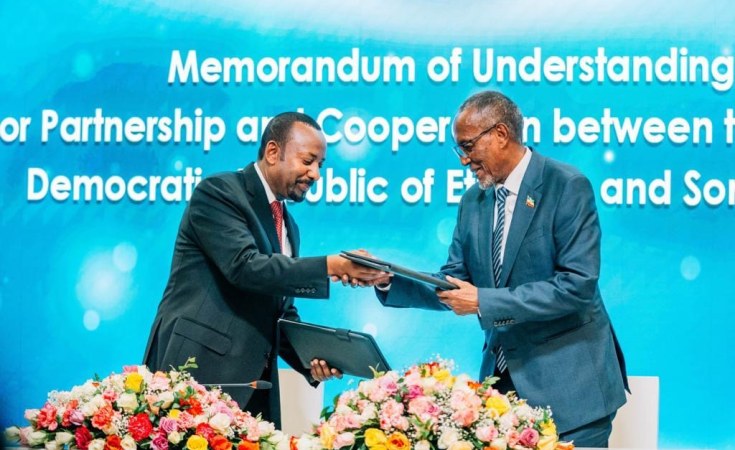Somalia has recalled its ambassador to Ethiopia and vowed to defend its territory after the breakaway region of Somaliland struck a controversial deal allowing Ethiopia access to the Red Sea.
The surprise memorandum of understanding (MOU) was signed by Ethiopian Prime Minister Abiy Ahmed and Somaliland's leader Muse Bihi Abdi in Addis Ababa.
Ethiopia lost its access to the Red Sea in 1933 following the independence of Eritrea, a former Ethiopian region. The landlocked country has been seeking access to sea channels for shipping ever since.
The port deal has triggering anger in Mogadishu, which only days earlier had agreed to resume dialogue with its breaking-away region of Somaliland after years of stalemate.
Somalia described the move as "a violation of its sovereignty", with Prime Minister Hamza Abdi Barre vowing to defend Somali territory by "all legal means possible".
The Somali cabinet issued a statement to say that Somaliland was, under the constitution, a part of Somalia and the MOU was therefore "null and void".
Somalia said it would also appealing to the United Nations, the African Union, the Arab League and regional East African grouping IGAD to force Ethiopia to adhere to international law.
Red Sea gateway
For Ethiopia, the second most populous country in Africa, access to the Red sea would offer a key waterway for global trade.
The deal with Somaliland opens the port of Berbera, on the southern coast of the Gulf of Aden, an African gateway to the sea and further north to the Suez Canal.
Ethiopia had maintained a fragile access to a port in Eritrea until the two countries went to war in 1998-2000. Since then Ethiopia has funnelled most of its trade through Djibouti.
Somaliland's foreign minister welcomed what he called an "historic" agreement that ensured Ethiopia's "formal recognition of the Republic of Somaliland".
Regional tensions
Ethiopia's Prime Minister sparked concerns in the region in October last year when he said his country would assert its right to access the Red Sea.
Observers were particularly worried given the ongoing tensions with Eritrea. Now it's feared the move could generate a conflict between Ethiopia and Somalia.
In 1991, Somaliland claimed independence from Somalia, which is not recognised internationally. The former British protectorate with a population of 4.5 million has a long coastline on the Gulf of Aden.
On Friday, Somalia and Somaliland agreed to resume dialogue after two days of talks mediated by Djibouti, the first of their kind since 2020.
The deal was welcomed by IGAD, which Somalia joined in November. Britiain described it as a "vital step towards reconciliation".
(with newswires)


